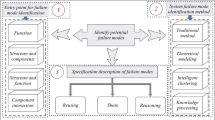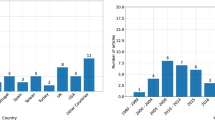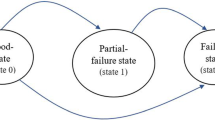Abstract
An adaptive method of residual life estimation for deteriorated products with two performance characteristics (PCs) was proposed, which was sharply different from existing work that only utilized one-dimensional degradation data. Once new degradation information was available, the residual life of the product being monitored could be estimated in an adaptive manner. Here, it was assumed that the degradation of each PC over time was governed by a Wiener degradation process and the dependency between them was characterized by the Frank copula function. A bivariate Wiener process model with measurement errors was used to model the degradation measurements. A two-stage method and the Markov chain Monte Carlo (MCMC) method were combined to estimate the unknown parameters in sequence. Results from a numerical example about fatigue cracks show that the proposed method is valid as the relative error is small.
Similar content being viewed by others
References
SI Xiao-sheng, WANG Wen-bin, HU Chang-hua, ZHOU Dong-hua. Remaining useful life estimation-A review on the statistical data driven approaches [J]. European Journal of Operational Research, 2011, 213(1): 1–14.
GEBRAEEL N Z, LAWLEY M A, LI RONG, RYAN J K. Residual-life distributions from component degradation signals: A Bayesian approach [J]. IIE Transactions, 2005, 37(6): 543–557.
WANG Wen-bin, CARR M, XU Wei-jian, KOBBACY A K. A model for residual life prediction based on Brownian motion with an adaptive drift [J]. Microelectronics Reliability, 2010, 51(2): 285–293.
NOORTWIJK J M. A survey of the application of Gamma processes in maintenance [J]. Reliability Engineering and System Safety, 2009, 94(1): 2–21.
KHAROUFEH J P. Explicit results for wear processes in a Markovian environment [J]. Operations Research Letters, 2003, 31(3): 237–244.
SARI J K, NEWBY M J, BROMBACHER A C, TANG L C. Bivariate constant stress degradation model: LED lighting system reliability estimation with two-stage modelling [J]. Quality and Reliability Engineering International, 2009, 25(8): 1067–1084.
PAN Zheng-qiang, BALAKRISHNAN N, SUN Quan. Bivariate constant-stress accelerated degradation model and inference [J]. Communications in Statistics — Simulation and Computation, 2011, 40(2): 259–269.
PAN Zheng-qiang, BALAKRISHNAN N, SUN Quan, ZHOU Jing-lun. Bivariate degradation analysis of products based on Wiener processes and copulas [J]. Journal of Statistical Computation and Simulation, 2012(ahead-of-print): 1–14.
WANG Ya-ping, PHAM H. Modeling the dependent competing risks with multiple degradation processes and random shock using time-varying copulas [J]. IEEE Transaction on Reliability, 2012, 61(1): 13–22.
NELSEN R B. An Introduction to Copulas [M]. New York: Springer Science, 2006: 109–150.
PENG C Y, TSENG S T. Mis-specification analysis of linear degradation models [J]. IEEE Transaction on Reliability, 2009, 58(3): 444–455.
WANG Xiao. Wiener processes with random effects for degradation data [J]. Journal of Multivariate Analysis, 2010, 101(2): 340–351.
TSAI C C, TSENG S T, BALAKRISHNAN N. Mis-specification analyses of gamma and Wiener degradation processes [J]. Journal of Statistical Planning and Inference, 2011, 141(12): 3725–3735.
WANG Xiao-lin, GUO Bo, CHENG Zhi-jun. Real-time reliability evaluation of equipment based on separated-phase Wiener-Einstein process [J]. Journal of Central South University: Science and Technology, 2012, 43(2): 534–540. (in Chinese)
SI Xiao-sheng, WANG Wen-bin, HU Chang-hua, ZHOU Dong-hua, PECHT M G. Remaining useful life estimation based on a nonlinear diffusion degradation process [J]. IEEE Transaction on Reliability, 2012, 61(1): 50–67.
ZHOU Dong-hua, FRANK P M. Strong tracking filtering of nonlinear time-varying stochastic systems with colored noise: Application to parameter estimation and empirical robustness analysis [J]. International Journal of Control, 1996, 65(2): 295–307.
MEEKER W Q, ESCOBAR L A. Statistical methods for reliability data [M]. New York: John Wiley & Sons, 1998: 639–640.
Author information
Authors and Affiliations
Corresponding author
Additional information
Foundation item: Project(60904002) supported by the National Natural Science Foundation of China
Rights and permissions
About this article
Cite this article
Wang, Xl., Guo, B., Cheng, Zj. et al. Residual life estimation based on bivariate Wiener degradation process with measurement errors. J. Cent. South Univ. 20, 1844–1851 (2013). https://doi.org/10.1007/s11771-013-1682-9
Received:
Accepted:
Published:
Issue Date:
DOI: https://doi.org/10.1007/s11771-013-1682-9




